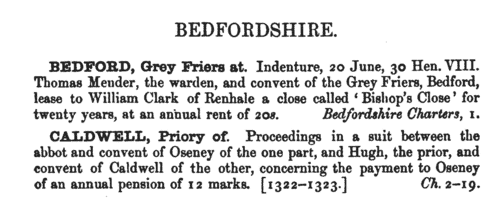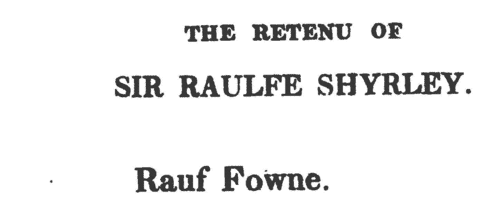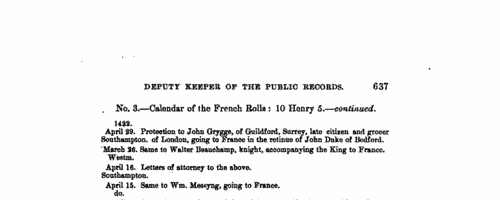Selby Surname Ancestry ResultsOur indexes 1000-1999 include entries for the spelling 'selby'. In the period you have requested, we have the following 802 records (displaying 31 to 40): Single Surname Subscription | | | Buying all 802 results of this search individually would cost £4,324.00. But you can have free access to all 802 records for a year, to view, to save and print, for £100. Save £4,224.00. More... |
These sample scans are from the original record. You will get scans of the full pages or articles where the surname you searched for has been found. Your web browser may prevent the sample windows from opening; in this case please change your browser settings to allow pop-up windows from this site. Fine Rolls
(1377-1383)
The fine rolls of the 1st to 6th years of the reign of king Richard II record part of the government administration in England, with orders sent out day by day to individual officers, and commitment of particular responsibilities and duties. There is also some material relating to Wales, Scotland, Ireland and the English possessions in France. SELBY. Cost: £4.00.  | Sample scan, click to enlarge

| Court rolls of manors held by Durham priory
(1296-1384)
The cathedral priory of Benedictines (black monks) of St Cuthbert at Durham possessed many manors in the county. These were administered by halmotes, or manor courts, held in three sessions (tourns or turns) each year (here marked I., II. and III.), before the terrar (obedientiary), steward, bursar, and/or the prior himself. The court rolls recording proceedings in these courts survive from 1296, 1300, 1309, and from 1333, but with years missing, until becoming fairly continuous from 1365 onwards. Extracts from the rolls from 1296 to 1384 were edited by John Booth and published by the Surtees Society in 1886. The manors under this jurisdiction were Aycliffe, Bellasis, (Newton) Bewley, Billingham, Burdun, Chilton, Coupon, Dalton, Edmondbyers, Ferry (Hill, or Ferrycliffe), Fulwell, Harton, Hebburn, Hedworth, Hesledon, Heworth, Jarrow, Kirk Merrington, East Merrington, West Merrington and Mid Merrington, Monkton, Moorsley, Newton Ketton, Nunstanton, North and South Pittington, East and West Rainton, Ravensflat, Shields, Southwick, Spen, Usworth, Wallsend, Wardley, Wearmouth, Westoe, Willington and Wolviston. The main contents of the records are demises of land held by the bond tenants, neifs, cotmen and others, and of the demesne lands; and bye-laws and pains (penalties) for breach of these; and other minor delinquencies.
Normally, when a farm, cottage or piece of land was let to a new tenant, the name of the last tenant is also given, as well as the amount of the rent, and the amount of the gersum (fine on entry). These court rolls contain some of the only surviving evidence for the inhabitants of these townships in this period: but this publication was of extracts, and was not comprehensive. It should also be noted that the third tourn each year (III.) usually took place in January to March, and so by modern dating in the following year. Thus, the third tourn of 1296 was held on 4 March 1297.SELBY. Cost: £4.00.  | Sample scan, click to enlarge

| Liegemen and Courtiers (1397)
The surviving earliest records of the Privy Council of England, from the 10th year of the reign of Richard II to the 11th year of Henry IV, mostly found among the Cottonian manuscripts in the British Museum, were transcribed literatim by sir Harris Nicolas and printed in 1834 by command of king William IV. The records mainly refer to the day to day business of the Crown, particularly regarding the administration of the kingdom and relations with France, Scotland, Ireland and Wales. Almost all are in French.
SELBY. Cost: £6.00.  | Sample scan, click to enlarge

| Inhabitants of London
(1375-1399)
Letter Book H of the City of London contains enrolments of recognizances between inhabitants, particularly citizens, for sums of money lent or due; grants of pieces of land or property; and various records relating to the city administration.
SELBY. Cost: £4.00.  | Sample scan, click to enlarge

| Oxfordshire Charters
(1390-1399)
A large accumulation of documents preserved in the Bodleian Library, Oxford, formerly constituted the antiquarian collections of Anthony a Wood, Roger Dodsworth, Ralph Thoresby, Thomas Martin of Palgrave, Thomas Tanner bishop of St Asaph, Dr Richard Rawlinson, Richard Furney archdeacon of Surrey, and Richard Gough. A calendar of these was prepared by William H. Turner and published in 1878 under the title 'Calendar of Charters and Rolls preserved in the Bodleian Library'. The word 'charters' is here used in a rather loose sense, including virtually any manuscript or copy of a manuscript, but the bulk of the contents consists of mediaeval deeds of conveyance. Turner's calendar deals with each briefly, naming the principal parties and the nature of the deed, but hardly ever lists the witnesses. Many of these charters were undated (dating of deeds did not become general until around 1350) or so damaged or defective ('mutilated' is Turner's usual description) as no longer to display a legible date. However, he contrived, from the style of the script and/or the nature of the contents, to estimate dates in such cases. The sample scan is from the start of the Bedfordshire list. SELBY. Cost: £4.00.  | Sample scan, click to enlarge

| Clergy, the religious and the faithful in Britain and Ireland
(1362-1404)
These are abstracts of the entries relating to Great Britain and Ireland from the Regesta of popes Urban V, Gregory XI, (Anti-Pope) Clement VII, Urban VI and Boniface IX, and the Lateran Regesta of Boniface IX. Many of these entries relate to clerical appointments and disputes, but there are also indults to devout laymen and women for portable altars, remission of sins, &c. This source is particularly valuable for Ireland, for which many of the key government records of this period are lost. Urban V was consecrated and crowned 6 November 1362 (the day from which his pontificate is dated); Gregory XI was crowned 5 January 1371; Clement VII 31 October 1378; Urban VI 18 April 1378; Boniface IX 9 November 1389 and died 1 October 1404. Until 1376 the papacy was in exile at Avignon. The extracts were made by W. H. Bliss from Regesta ccxlv to cccxx and Lateran Regesta i to xliii, and published in 1902. Bliss remarked that 'although the writing of the Papal Registers of the 14th century is clearer than that of many contemporary English MSS., the entries in them were for the most part founded upon petitions or letters from different countries, and the scribes in the Papal Chancery must have experienced even greater difficulty in copying English proper names than English students experience nowadays in reading the early Chancery Rolls preserved in the Public Record Office. Not having local or personal knowledge, they constantly misread doubtful letters.'SELBY. Cost: £4.00.  | Sample scan, click to enlarge

| English knights at Agincourt
(1415)
At the battle of Agincourt, 25 October 1415, English forces under king Henry V inflicted a signal defeat on the French forces led by the Constable D'Albret. The English are said to have numbered about 15,000 men. This list of 'The Names of the Dukes, Erles, Barons, Knights, Esquires, Serviteurs and others that wer withe the Excellent Prince King Henry the Fifte at the Battell of Agincourt' is of the leaders of the English forces and of the knights (lances) in their retinues: of the archers, for which the battle is famous, hardly a handful are named. Nicholas Harris Nicolas, the antiquarian, found this list accidentally among the manuscripts in the British Museum, and published it, with an extensive account of the battle, in 1827.SELBY. Cost: £4.00.  | Sample scan, click to enlarge

| Grantees of offices, commissions and pardons
(1413-1416)
The Patent Rolls are the Chancery enrolments of royal letters patent. Those for the 1st, 2nd and 3rd years of the reign of king Henry V (21 March 1413 to 20 March 1416) were edited for the Public Record Office by R. C. Fowler, and published in 1910. The main contents are royal commissions and grants; ratifications of ecclesiastical estates; writs of aid to royal servants and purveyors; and pardons. The commissions of the peace issued for the English towns and counties and entered on the rolls, being largely repetitive, have been consolidated in a single appendix.SELBY. Cost: £2.00.  | Sample scan, click to enlarge

| The English in France
(1417-1418)
King Henry V of England claimed the throne of France (and quartered the fleurs-de-lis of France with the lions of England on the royal standard) as had his predecessors since Edward III, as descendants of Philip IV of France. He married Katherine, youngest daughter of king Charles VI of France in 1420, and thereafter styled himself 'heir and regent of France'. The English had real power or influence in Brittany, Normandy, Flanders and Gascony, and actual possession of several coastal garrisons, in particular Calais, where the French inhabitants had been replaced by English. The English administration kept a series of records called the French Rolls. On these are recorded royal appointments and commissions in France; letters of protection and safe-conduct to soldiers, merchants, diplomats and pilgrims travelling to France from England and returning, and to foreign legations. There are also licences to merchants to export to the Continent, and to captains to transport pilgrims. This calendar of the French Roll for the 5th year of the reign of Henry V (21 March 1417 to 20 March 1418) was prepared by Alexander Charles Ewald and published in 1883. SELBY. Cost: £6.00.  | Sample scan, click to enlarge

| Worcestershire landowners
(1428)
An inquiry was held at Worcester 30 September 1428 into the ownership of the knight's fees from each hundred in the county (but not the city) of Worcester. The jurors based their findings on a previous inquiry a few years earlier, so that for each fee or portion of a fee the name of the previous freeholder is also given. This inquiry was used as the basis for the raising of a subsidy from the laity, taxed at 6s 8d per owner of an entire knight's fee, 1s 8d for a quarter of a knight's fee, smaller fractions being exempt; in addition, the population of each parish was taxed by a formula based on earlier taxations dating back to 1290; but the taxation of the parishes was levied by the parishes themselves, so there is no return of individual householders. The names that appear in these records (the inquiry and the subsequent lay subsidy roll) are thus those of the major freeholders, the jurors, assessors and collectors. The rolls were edited and translated by John Amphlett for the Worcestershire Historical Society and printed in 1902.SELBY. Cost: £4.00.  | Sample scan, click to enlarge

|
Research your ancestry, family history, genealogy and one-name study by direct access to original records and archives indexed by surname.
|












